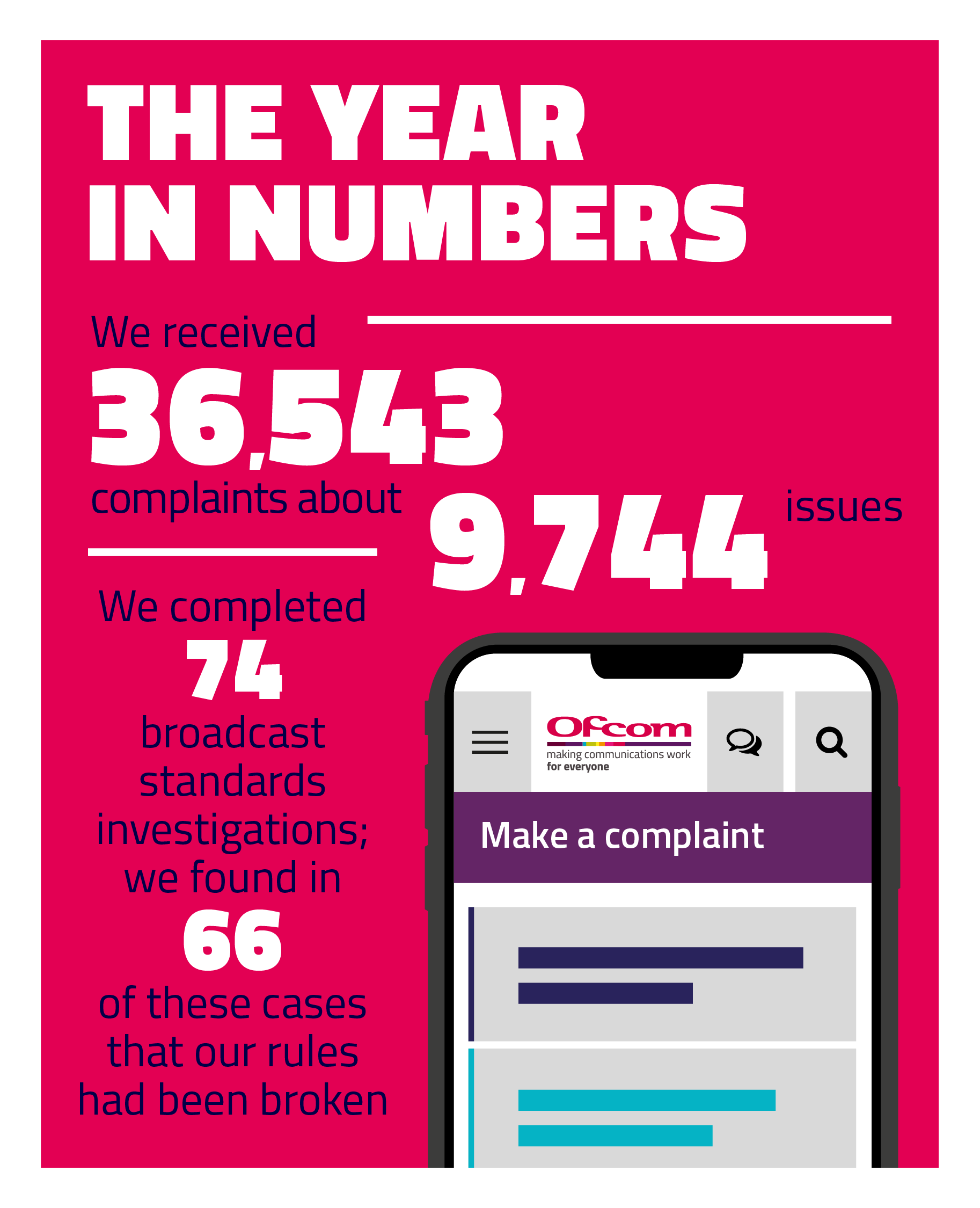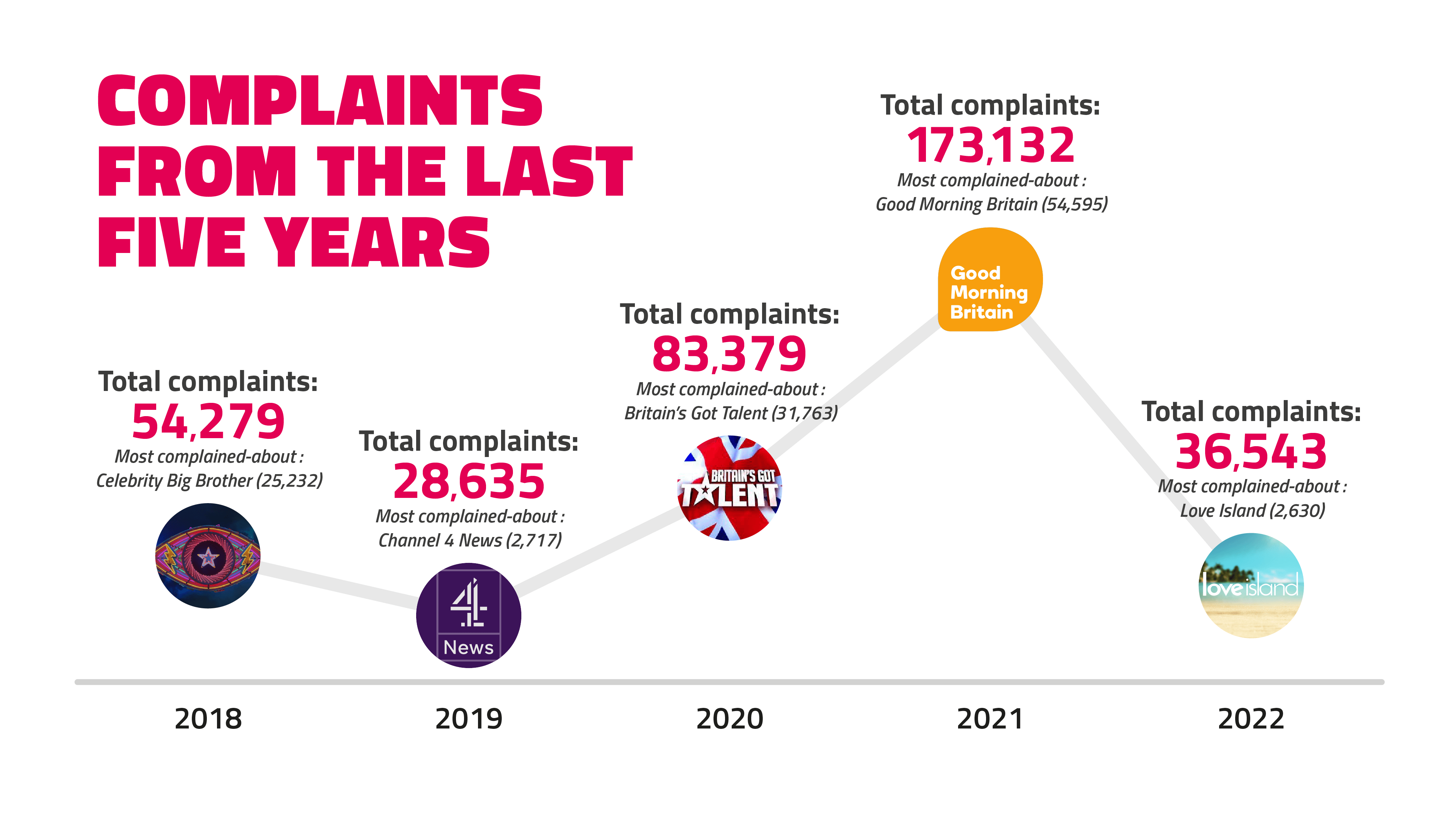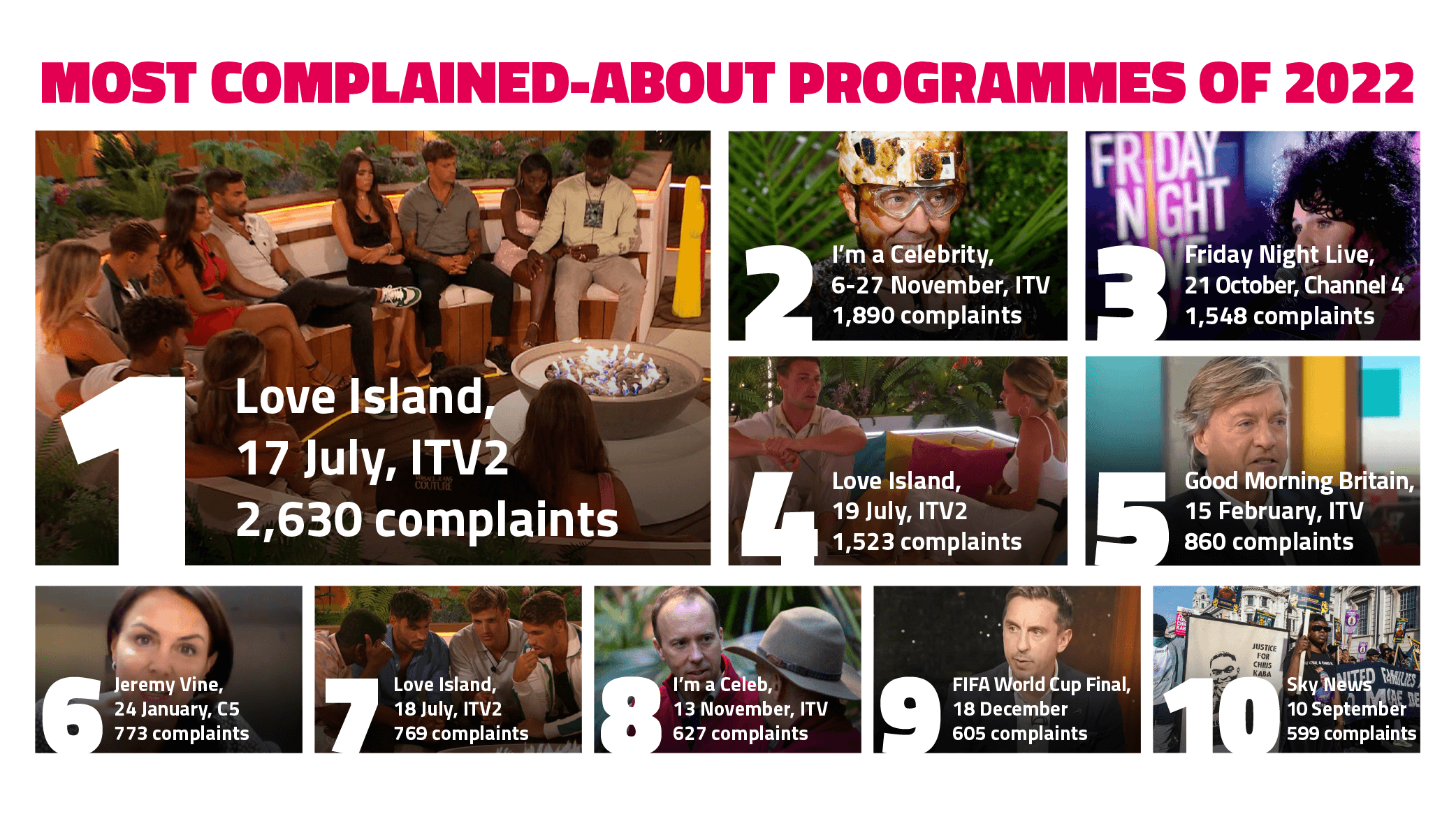
Adam Baxter, Director, Standards and Audience Protection, reflects on our broadcasting work in 2022.
This year, we were frequently reminded of the power of TV as it brought us together for historic moments like the funeral of HM Queen Elizabeth II and the Lionesses’ victory in the Women’s Euro 2022 football tournament. TV news kept us informed about the war in Ukraine and political developments at home. And the nation sat down to watch the final (for now?) episode of the iconic soap Neighbours.
Ofcom was tagged in thousands of online conversations about TV and radio, and we even became the subject of a meme when Love Island aired its ‘Movie Night’ episode.
Over the year, we received 36,543 complaints about over 9,500 issues, and completed 74 broadcast standards investigations. We found in 66 of these cases that our rules had been broken. We also completed 45 fairness and privacy investigations during the year, of which six complaints were upheld. These figures show the weight we place on freedom of expression, and that we only step in when it’s really needed.

Importantly, this number doesn’t include complaints about programmes on the BBC. These are handled by the BBC in the first instance. In the summer, we told the BBC that we expect it to improve how it handles complaints from viewers and listeners. And we were pleased to see it recently announce that it would be changing its processes to make it easier for people to complain.
People complain to us for a host of different reasons, and, for Ofcom, complaints are a vital barometer for how audiences think and feel.
2022’s list of most complained about programmes is, once again, dominated by reality TV – in particular ITV’s Love Island and I’m a Celebrity Get Me Out of Here! Given the large viewing figures, and the headlines and conversations created by these shows – both online and offline – it is not surprising to see them topping our chart.
People might think that because a programme has prompted a high number of complaints it must automatically mean our rules have been broken. But that’s not the case. We carefully assessed complaints about both of these programmes and found that neither warranted further investigation under our rules. So why didn’t these programmes prompt us to intervene?
Let’s start with the episode of Love Island, which occupies the top spot as the most complained-about programme of the year. Complaints related to alleged misogynistic and bullying behaviour by some contestants in the villa, and we carefully assessed each and every one of these complaints.. We ultimately concluded that the programme did not warrant formal investigation because of how this behaviour was put into context on the programme.
The second biggest issue driving complaints this year was viewers objecting to Matt Hancock’s participation in I’m a Celebrity, Get Me Out of Here!. And interestingly, an almost identical number of complainants objected to what they saw as negative treatment of him on the show.
But under our rules, and taking into account freedom of expression, there is no ban on any particular person taking part in programmes. However, if the inclusion of someone in a programme is likely to cause offence, we expect broadcasters to take steps to mitigate or justify that offence. How they do that editorially, is up to them.
When considering complaints about both of these programmes, we also took into account that these are long-running shows whose format is well-established. So viewers tuning in would expect to see couples’ relationships being tested during the course of Love Island and celebrities being subject to repetitive public votes to carry out trials on I’m a Celebrity…!.
The eagle-eyed among you may have noticed that our complaints numbers are lower this year than in the past two years. In fact, they’re closer to the numbers we received in 2018 and 2019. Some people may speculate that the impact of the pandemic on our watching habits and on the national mood may be a factor. Others might note that no single programme has sparked the controversy seen in previous years.
But do fewer complaints mean our work has been less important this year? Far from it - it’s been a busy year for Ofcom’s broadcasting standards team.
In 2022, we assessed 9,744 issues – two-thirds of the number from 2021 which was a record year for us .

Among these 9,744 were significant and serious issues. I won’t list every assessment and decision we have made this year, but a few stand out.
We investigated Channel 4 and found it breached licence conditions over subtitle problems – a service relied upon by millions.
We concluded our investigation into the BBC's coverage of an antisemitic attack, issuing an Opinion that its online coverage was a significant failure to observe its editorial guidelines to report news with due accuracy and due impartiality.
We continued our work to protect audiences from harm, and imposed sanctions on six broadcasters for content breaches, including suspending KTV’s licence following a serious breach of broadcasting rules.
In March, we revoked Russian broadcaster RT’s UK broadcasting licence. This is after we found that it was not fit and proper to hold a licence in the UK.
We also conducted 29 investigations into programmes on RT which we found in breach of our due impartiality rules.
Revocation of a licence is not something we do often or take lightly. We guard freedom of expression fiercely in this country, and the bar for action on broadcasters is rightly set very high.
Viewers and listeners will always remain at the heart of what we do, and we consider every complaint we receive carefully. We’re looking forward to another year of protecting audiences from harm and upholding freedom of expression on your screens and airwaves.

Top ten complaints:
- Love Island, ITV2, 17 July - complaints related to alleged misogynistic and bullying behaviour by some contestants in the villa.
- I’m a Celebrity.... Get me out of here!, ITV, 6-27 November - viewers objected to the inclusion of Matt Hancock in the series.
- Friday Night Live, Channel 4, 21 October - complaints related to a performance by Jordan Gray.
- Love Island, ITV2, 19 July - complaints related to alleged misogynistic and bullying behaviour by some contestants in the villa.
- Good Morning Britain, ITV, 15 February - complaints related to comments made by Richard Madeley about death threats made to Keir Starmer.
- Jeremy Vine, Channel 5, 24 January - viewers complained about a health consultant’s inaccurate statement about numbers of unvaccinated people in hospital with Covid-19.
- Love Island, ITV2, 18 July - complaints related to alleged misogynistic and bullying behaviour by some contestants in the villa.
- I’m a Celebrity.... Get me out of here!, ITV, 13 November - viewers objected to bullying behaviour against Matt Hancock.
- FIFA World Cup Final 2022: Argentina v France, ITV, 18 December - complaints related to politicised comments from Gary Neville.
- Sky News, Sky News, 10 September - a Justice for Chris Kaba walk was reported as people on their way to pay tribute to the late Queen. Ofcom is investigating whether this breached our rules on due accuracy.
Complaints figures were captured during the period 1 January – 19 December 2022.
All complaints to Ofcom are published in our Broadcast Bulletins.
